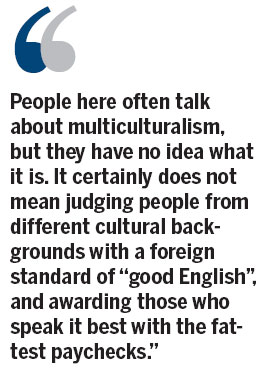Be proud of your culture lah
Updated: 2014-05-30 05:02
By Jony Lam(HK Edition)
|
|||||||
A couple of months ago, some fellow Hongkongers said they would die to protect Cantonese, as it is our "local language". It started with our Secretary for Education Eddie Ng Hak-kim calling Cantonese a dialect and "not official Chinese". People felt his comments insulted our sacred "mother tongue", although in fact a lot of our mothers spoke something other than Cantonese when they first arrived in this city decades ago.
Christopher Chung Shu-kun, a people's representative in the Legislative Council, uttered a classic line of local Chinglish - "I don't think so lor," and he was grilled for it.
Irregularities like these make the world interesting.
Jay Walder is a charming man. Sexily bald, his sweet Indiana accent and deep voice have never failed to add substance to the sometimes meaningless words he utters. In that now infamous conversation, Chung asked him whether he does anything other than sit in his office passively waiting for reports. He replied to that the Mass Transit Railway Corporation (MTRC) has procedures while passively waiting for reports. But he was cool. His accent had an air of royal glamour.
The next day, the city turned a blind eye to Walder's questionable performance and the fact he is criminally overpaid. Instead, they made fun of Chung's "broken English".
"Chung has no excuse for speaking English poorly," Alex Lo of the South China Morning Post wrote. "After all, children and students may be listening." Right, children and students listening to a LegCo meeting - that would be a political journalist's dream come true. Other less explicit papers run features about the city's declining English-language skills since the 1997 handover, including interviews with dissatisfied employers and all that.

People made a mistake when they said Chung spoke "bad English". Imagine someone telling Singaporeans their Singlish is a degraded version of English. In fact, both Singlish and Hong Kong Chinglish (not to be confused with other versions of Chinglish like "no zuo no die") are creoles, stable and natural languages with features and a vocabulary supplied by their parent languages. They have their unique phonetics and syntax, even their own grammar. As Singaporeans like to say, non-natives can't speak proper Singlish without making some effort and they are tired of people pretending to speak Singlish by speaking bad English.
We were upset when our city was overtaken by Singapore in a recent ranking of competitiveness. In general, Singaporeans speak more (and arguably better) English than Hongkongers, and they also speak a lot of Singlish. While the legitimacy of Singlish remains contentious in Singapore, unlike Hong Kong, there is a sizable population willing to publicly declare: "Be Proud of speaking Singlish lah! Make Singlish become our national language can?"
The Christopher Chung incident reminds me of Singapore's controversial Speak Good English Movement (SGEM), a campaign that promotes "grammatically correct English that is universally understood". In Singapore, people opposed the government initiative with the "Save Our Singlish Campaign" and the "Speak Good Singlish Movement." Here, the anti-establishment "progressives" attempted to impose a local version of the SGEM.
We should not rush to judge Chung over the standard of his English. If we listen closely, he started his diatribe in Cantonese, and later switched between English and Chinese phrases. Linguists call this "code-switching", which refers to the practice of alternating between two or more languages, or language varieties, in the context of a single conversation. Code-switching is often employed by speakers of more than one language. They use elements of many languages in conversations.
People here often talk about multiculturalism, but they have no idea what it is. It certainly does not mean judging people from different cultural backgrounds with a foreign standard of "good English", and awarding those who speak it best with the fattest paychecks. Genuine multiculturalism requires that we respect the different cultures in our city, and take and use elements from them into a common working language.
Hongkongers are talking and texting spontaneously with lah, mei, lor, etc. What is the big deal if a people's representative brings local flavor to a meeting? His colleagues are yelling and throwing things, for crying out loud! If people here are really so concerned about high linguistic standards, I am sure they will be thrilled by the idea of a Speak Good Putonghua Movement too.
The author is a current affairs commentator.
(HK Edition 05/30/2014 page9)